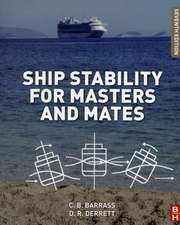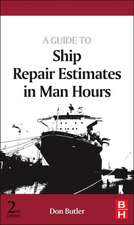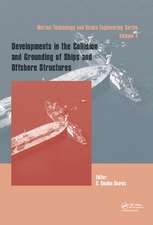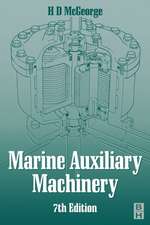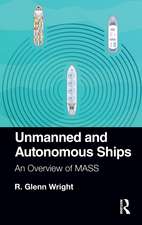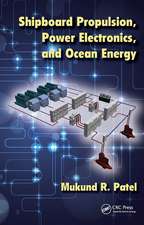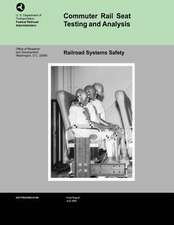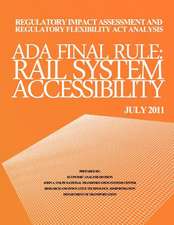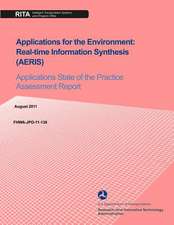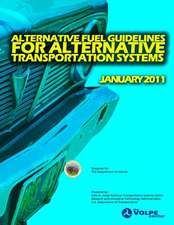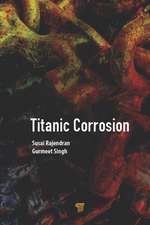Dynamic Positioning for Engineers
Autor Surender Kumaren Limba Engleză Hardback – 29 oct 2020
- Explains automation and its application in the DP system
- Describes environmental sensors and position reference sensors as important inputs to the DP system
- Includes chapters on power management and thrusters
- Aids engineers in maintaining a the DP system in good operational condition
| Toate formatele și edițiile | Preț | Express |
|---|---|---|
| Paperback (1) | 590.35 lei 3-5 săpt. | +14.60 lei 6-10 zile |
| CRC Press – 29 oct 2020 | 590.35 lei 3-5 săpt. | +14.60 lei 6-10 zile |
| Hardback (1) | 1546.43 lei 6-8 săpt. | |
| CRC Press – 29 oct 2020 | 1546.43 lei 6-8 săpt. |
Preț: 1546.43 lei
Preț vechi: 1885.88 lei
-18% Nou
Puncte Express: 2320
Preț estimativ în valută:
295.91€ • 322.44$ • 249.35£
295.91€ • 322.44$ • 249.35£
Carte tipărită la comandă
Livrare economică 23 aprilie-07 mai
Preluare comenzi: 021 569.72.76
Specificații
ISBN-13: 9780367512408
ISBN-10: 0367512408
Pagini: 194
Ilustrații: 105 Illustrations, black and white
Dimensiuni: 156 x 234 x 15 mm
Greutate: 0.5 kg
Ediția:1
Editura: CRC Press
Colecția CRC Press
ISBN-10: 0367512408
Pagini: 194
Ilustrații: 105 Illustrations, black and white
Dimensiuni: 156 x 234 x 15 mm
Greutate: 0.5 kg
Ediția:1
Editura: CRC Press
Colecția CRC Press
Public țintă
Professional Practice & DevelopmentCuprins
1. Introduction to Offshore. 2. Historical background to development of Dynamic Positioning. 3. The Seven Components of DP System. 4. Six Degrees of Freedom – Basics of Dynamic Positioning. 5. Different Types of DP Vessels and their applications. 6. DP Class / Equipment class (IMO-MSC 645/1580). 7. Basics of Electrical Propulsion and Thruster Types. 8. Thruster Controls and Automation of thrusters in DP. 9. Power Management System. 10. Harmonics in Power Syatem. 11. Introduction to Environmental Sensors. 12. Introduction to Position Reference Sensors. 13. Handling of Position Reference Sensors & Various Tests on PRS. 14. Architecture of DP System. 15. Basics of Networking in DP Systems. 16. Types of Signals used in DP Automation. 17. Consequence Analysis, Capability Plot, Foot prints and Motion Prediction. 18. DP Trials & Documentation. 19. Circuit Tracing & Fault Finding on DP. 20. Roles and Responsibilities. 21. Glossary. 22. References.
Notă biografică
Founding Director and the current Vice President of the Maritime Trainers Guild (India). A Chartered Engineer (UK), Chartered Marine Engineer (UK), Chartered Marine Technologist, Fellow - Institute of Marine Engineering Science & Technology(FIMarEST).Fellow (FNI) - The Nautical Institute, London. Fellow (fDPO) - International Association of DP Operators-London. PhD Thesis - in the field of Maritime Training Evaluation titled "Effectiveness of Seafarer's Training Using Maritime Simulators". An internationally experienced maritime trainer, genuinely interested in learning and teaching Dynamic Positioning and other simulator based specialised training. Experienced in setting up and getting The Nautical Institute accreditation of DP Training facilities. Experienced in leading a team to design, develop and getting MCA (UK) approval for various training schemes for deck and engine departments.
Descriere
Dynamic Positioning (DP) for Engineers enables the reader to acquire the basic knowledge about the concept and understanding of the system, from the systems perspective including components of the DP system, to better tackle maintenance, problems and breakdowns, leading to an increased mean time between failures and effective fault finding.

